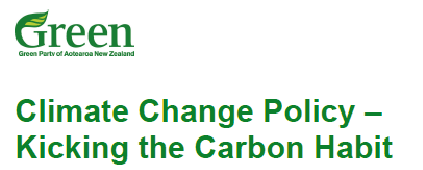Dr Kennedy Graham of the New Zealand Greens
 Click logo to return to 'links-page'
Click logo to return to 'links-page'
Back to UNFCCC Submission Back to Signatory List
Dear Aubrey,
I support the Contraction and Convergence Principle as the way ahead for bringing into effect the global reduction curve of greenhouse gas emissions.
This should be introduced into the framework for the forthcoming negotiations for a comprehensive global legal agreement under the UNFCCC process.
I pledge my support to assist in this endeavour.
Dr Kennedy Graham, MP
Global Affairs Spokesperson (Green Party)
Deputy Chairman, Foreign Affairs, Defence & Trade Committee
New Zealand Parliament
National sows fear and loathing about future emissions scenarios in the global South with no acknowledgment of a historical responsibility or per capita differential.
The Green Party acknowledges both historical and future responsibility. It embraces the need for contraction and convergence, for international equity, and thereby global legitimacy, to evolve.
Speech to the New Zealand Parliament by Dr Kennedy Graham Green MP
"As the Minister made clear recently in question time, the state of play is the Copenhagen Accord, with voluntary commitments to national cuts. These are demonstrably inadequate to the science-based judgment of what is required to avert failure, but we pretend that it is a useful start to greater things. We are told that global emissions must peak within about 7 years, and we know that the Accord is way short of achieving that, so we mumble about bigger cuts later and avoid looking into our children's eyes.
Let us address some facts. To achieve a 2 degrees Celsius threshold, we must reduce our global carbon budget from 50 gigatonnes today to 36 by 2020, and seven by 2050. The rich countries must cut from about 40 today to 11 by 2020 and one by 2050. That is correct: we in the rich world must emit only one gigatonne in 2050, out of the seven emitted by the world that year. It is called contraction and convergence, and it is the only way humanity will successfully deal with climate change. That is when our moral and political standards will merge at the global level."
I rise to address the issue of climate change and this Government's failure to develop adequate national policy to combat it. Climate change has slipped below the threshold of daily media focus and that is the way that this Government seems to want it.
The failure at Copenhagen to tackle the global threat head on has sent the international community into a state of collective catatonia. We see this in the lack of leadership from the UN itself, in the actions of national Governments around the world, and in the attitude of much of the public around the world. The problem we have is that Nature is not disposed to wait for humanity to iron itself out morally and get its political act together.
The poor countries rail against us for historical responsibility and insufficient reduction targets. The rich countries fear the projected population growth among the poor and insist that they enter binding commitments before we sign on to medium-term cuts.
Humanity probably faces only two global threats: immolation through nuclear conflict, or suffocation through global warming. The first is the product of traditional enmity; the enemy was the other tribe or the other nation. Climate change is the product of a new enemy: it is us.
We try to cut nuclear arsenals by changing the enemy's behaviour; we are required to cut carbon emissions by changing our own behaviour. It is no surprise that we are not succeeding. Most Governments lack the political courage to convey the magnitude of the climate change threat to their peoples, and they lack the political insight to prescribe the required global and national policies that are necessary.
Before, during, and since Copenhagen the threat of serious unpredictable climate change has grown. Our scientists do not know when non-linear change might occur, but they warn that tipping points exist. If the precautionary principle is to mean anything, we must all move with speedy purpose and resolve. Translated politically, that means we must act not as an international community of states, but as a global community of peoples who are represented by Governments. If the difference seems vanishingly small, then we do well to act on it none the less, lest our prospects of survival prove to be the same.
Our professional negotiators are rearranging the deckchairs, contemplating whether we shall have one or two legal agreements, and whether it will be next year or 3 or 10 years from now. Our political leaders dampen our expectations with appeals to realism. We all suffer from cognitive dissonance. Every so often we see the magnitude and imminence of the threat, and it is simply too frightening to accept individually and politically, so we basically return to business and government as usual.
As the Minister made clear recently in question time, the state of play is the Copenhagen Accord, with voluntary commitments to national cuts. These are demonstrably inadequate to the science-based judgment of what is required to avert failure, but we pretend that it is a useful start to greater things. We are told that global emissions must peak within about 7 years, and we know that the Accord is way short of achieving that, so we mumble about bigger cuts later and avoid looking into our children's eyes.
Let us address some facts. To achieve a 2 degrees Celsius threshold, we must reduce our global carbon budget from 50 gigatonnes today to 36 by 2020, and seven by 2050. The rich countries must cut from about 40 today to 11 by 2020 and one by 2050. That is correct: we in the rich world must emit only one gigatonne in 2050, out of the seven emitted by the world that year. It is called contraction and convergence, and it is the only way humanity will successfully deal with climate change. That is when our moral and political standards will merge at the global level.
After 10 millennia, especially the past two centuries, it is the moment of truth. For our part, New Zealand has to agree through treaty or by voluntary declaration in advance to cut our national emissions proportionately. That means we must cut from 78 million tonnes today to 56 million tonnes in 2020, down to 1.6 million in 2050.
That is the scale of the challenge before New Zealand. It is as well that we face up to it now, not when it is too late."

Key Principles
The Green Party believes that:
1. Climate change policy should be guided by the science with the
interests of the global community and environment ahead of the goal of economic growth
2. We must think long term and start early because of the lag time in climate effects.
3. We need to act quickly if we are to successfully limit global warming to
2 degrees C and prevent runaway climate change.
4. Total global emissions must be reduced quickly and converge to emission quotas that are based on equal per capita entitlements - a process known as contraction and convergence.
5. In order to achieve the necessary permanent reductions in greenhouse emissions all countries must be part of a binding international agreement that sets regular targets for emissions and monitors compliance with them.
6. Those countries with the highest per capita emissions must do the most to reduce their emissions.
7. Those sectors with the ability to reduce their emissions or to switch to non-emitting activities must do so as quickly as possible.
8. All sectors of the economy should cover the overall cost to the taxpayer of their emissions and do this in a fair and equitable manner, with no free riders.
New Zealand Green Party
